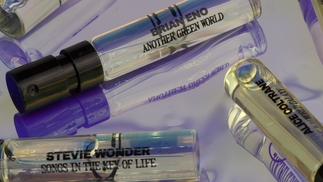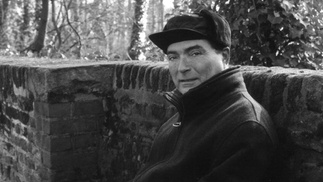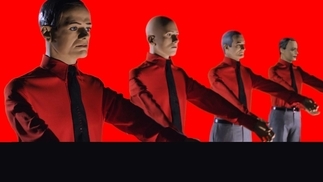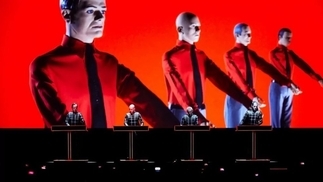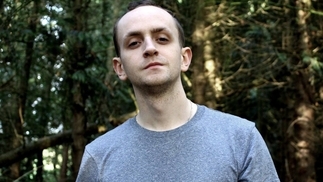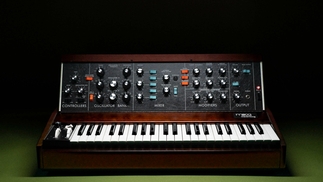THE CYCLIST: HAPPY TRAILS
The psychedelic distorted electronics of The Cyclist represent techno at its weirdest.
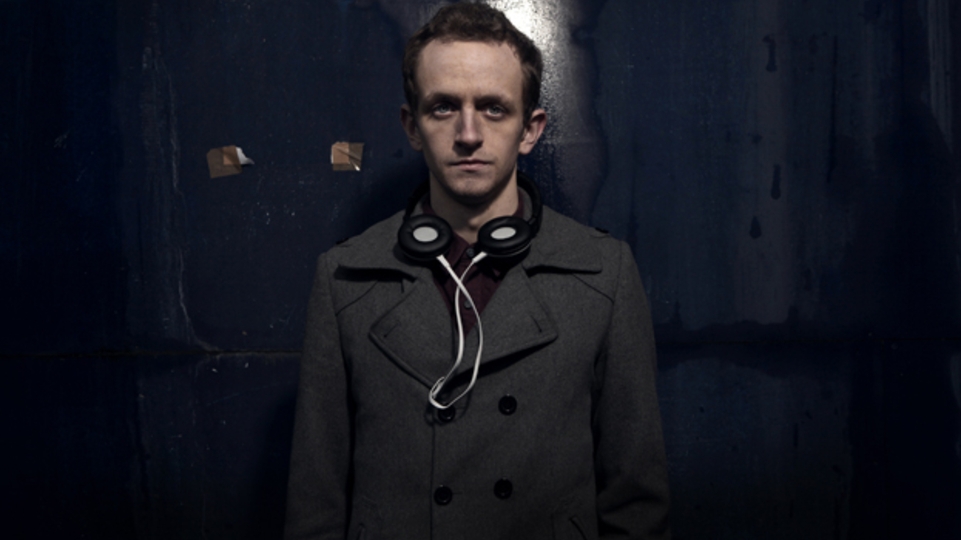
Underground electronic music is cyclical by nature, so where does Andrew Morrison fit in? The Liverpool-based producer is originally from Derry, but his music sounds like it comes from another dimension. Loosely based on house and techno, Morrison’s work as The Cyclist and more recently the psychedelic swagger of his Buz Luzdha project mark him out as an unusual talent. What’s more remarkable is that music is a sideline for Morrison.
“I’m studying pharmacology in Liverpool university — it’s research and lab-based and I’m really enjoying it,” he explains.
Morrison’s affinity for electronic music goes back to his early teens when, in a bizarre techological pairing, his older brother acquired both a tape casette player and a copy of Ableton.“I spent a lot of time messing around with the two of them — music inspired me, but what I had in front of me allowed me to experiment,” he says about his usage of the old and new technology.
At the time, Morrison’s musical tastes favoured post-punk and industrial acts like Cabaret Voltaire, but as he got older, he started to listen to early house and techno.
Unlike Belfast however, where electronic music prevailed in landmark clubs like Shine since the early '90s, there was nothing in Derry to cater for Morrison’s evolving tastes.
“There is a tiny little scene now but back when I started to produce and realised what I could do as an artist, there was a big heavy metal scene and I stayed well away from that,” he laughs.
Instead, Morrison did what so many artists of his generation opted for — he went online to seek inspiration. “You can find any kind of music from the '70s and '80s online, my influences are from all over the world,” he says. By the time he felt confident enough to start putting out music, he also used the internet to look for a suitable stage name. If you were convinced that his name was derived from a love of cycle trails, think again.
“The Cyclist is named after a futurist painting from early 1900s Russia. It’s all to do with colour and progression and was painted by a female artist around the time of the Bolsheviks,” Andrew explains.
GREY AREA
Once he had a name and was happy enough that his recordings could stand up to outside scrutiny, Andrew compiled some tracks and approached two labels, Crash Symbols and Leaving Records. Happily for Morrison, both of them responded positively.
“For the first release [on Crash Symbols], I had put together a mini-album of tracks, music that I had been working on since I had been a kid. I sent it to the two labels and they both responded really quickly and positively,” he explains, adding that “Once I had released the first album on Crash Symbols, I started on ‘Bones in Motion’ straight away.”
In places the Cyclist sound is naive — ‘Can’ from his first long-player samples the vocalist from Krautrockers Can over a ponderous Chicago bassline — and at other times it is beautifully serene, evidenced on the title track of ‘Bending Brass’. Overall though, it is true that the Cyclist’s tripped-out, woozy albums inadvertently catch the zeitgeist as techno and house increasingly stray from the dancefloor and towards abstract, freeform arrangements. Andrew says that he is uncomfortable with titles, but nonetheless recognises that his music does inhabit the grey zone where experimentalism and house/techno collide. “It’s trippy and it is dance music, but I don’t want to label it,” Morrison says.
Despite this, his work also attracted the attention of house and techno labels closer to home. Dublin is in the middle of an underground music boom and Morrison was tapped by Kenny Hanlon from Apartment Records to contribute the brooding, soundscape techno of ‘Crax’ to ‘Apartment 06’, the latest split release on the label that features other Irish artists like Slowburn, Tr-One and New Jackson.
“I was doing a gig in Galway and he got in contact afterwards,” he says about Hanlon’s advances. “They [Apartment] are putting out quite difficult, unusual electronic music, so I was happy to get involved.”
With two albums to his credit and an appearance on an acclaimed techno label, it is no surprise that Morrison has started to gig more around Europe. The fact that he now also has a booking agent helps, but it’s also down to the fact that there is greater acceptance of and hunger for the abstract, noisy end of dancefloor electronics. What does he make of the rise of labels like L.I.E.S and the popularity of out-there dance techno?
“There are some average records, but overall it’s something that was badly needed,” he claims. “Before that happened, there were a lot of house and techno records that sounded the same. In a strange way that was a good thing, because it forced people to make music that sounded different. There have always been a lot of producers on the fringes who were making interesting music, so this was a much-needed progression.” Morrison feels that one of the positives arising from the popularisation of abstract dance music is that it has given recognition to some unconventional artists. “I really like Actress; I hadn’t heard of him until someone compared my music to his,” he points out, adding that he is also a fan of Jon Hopkins’ last album and “all of Joy O’s tracks. I don’t really DJ, but I buy vinyl and once I get a record, I really hold onto it and play it a thousand times”.

PSYCHEDELIC DANCE
Morrison may not be an acclaimed DJ, but his latest project is his most dancefloor-friendly to date. Working under the pseudonym of Buz Ludzha, Morrison has just released ‘Love Repetitive Rhythmics’ on another Dublin label, the long-running All City. Inspired by Chicago house and the dreamy electronic melodies of Boards of Canada, it’s a wild, psychedelic release, one of the most distinctive records of the past few years. As Morrison explains, he signed to the label in a random manner. “It has got a great reaction so far, but when I first did those tracks, I wasn’t even sure if I would release them at all,” he says. “Then I met the All City guys when I was playing at a rooftop party in Dublin last summer and after talking to them for a while, I sent them on some of my music. It all just went from there.”
Like the Cyclist, Morrison explains that Buz Ludzha is derived from an unexpected source. “It’s named after this massive communist [monument] in Bulgaria, near Sofia, the capital,” he explains. “It’s the craziest-looking thing in the world, you should Google it [it looks like a massive UFO that has landed on the top of a hill]. I think that the first word is pronounced like ‘booze’ and part of the reason why I chose the name is because people won’t be able to say it properly. I can only imagine that there would be arguments about how to pronounce it,” he laughs. Given that he named both of his projects after east European cultural artefacts, is Morrison something of a communist?
“Nah, I’m not a communist — I hate all regimes, be they communist, Nazi or whatever else. If anything, I’m an egalitarian,” he believes. Despite its eastern European associations, the debut Buz Ludzha release is inspired by decidely western musical tropes from the US and the UK, and was a conscious departure by Morrison from his work as the Cyclist.
“I wanted to make this project much more dancey — the Cyclist’s tracks are very psychedelic, but Buz Ludzha is much more dancey. It was inspired by Boards of Canada but also by Mr Fingers, Chicago house and Ron Hardy. I spent a lot of time listening to his mixes,” he says of the late, great Music Box resident DJ. On ‘Bassline for Death’, it sounds like Morrison is also channelling Lone’s propensity for slightly out-of-tune melodies.
“Lone is good, but Boards of Canada changed my whole percepion about how to make music,” he believes.
POSITIVE EDGE
One of the other striking things about the debut Buz Ludzha release is its brevity; both tracks clock in at under five minutes and it feels like Morrison is trying and succeeding to cram as much as possible into these short musical bursts. He explains that this approach was unintentional.
“I’m going to make my tracks longer and I’d be happier putting out much longer work,” he says. “I’m going to do two more Buz Ludzha EPs for All City and we’re also talking about doing a mini-album as well, but I’m not sure if it’ll happen.”
Despite his new project, there is no danger of Morrison abandoning The Cyclist anytime soon. He will continue to play live under this name and he has also finished writing and recording his third artist album. Due to be released on Leaving Records, he says that it will be another tripped-out, psychedelic work, but with a positive edge. Judging by his comments, it also looks likely to re-ignite the age-old analogue vs digital debate.
“You know the way that people get hung up on the whole analogue thing? Well for this album, it’s going to be a mix of digital and analogue. It’ll be a distoriton of the two worlds, but I’m confident that no one will really notice the difference,” he believes. Once those psychedelic wheels keep turning, then all else is irrelevant.
